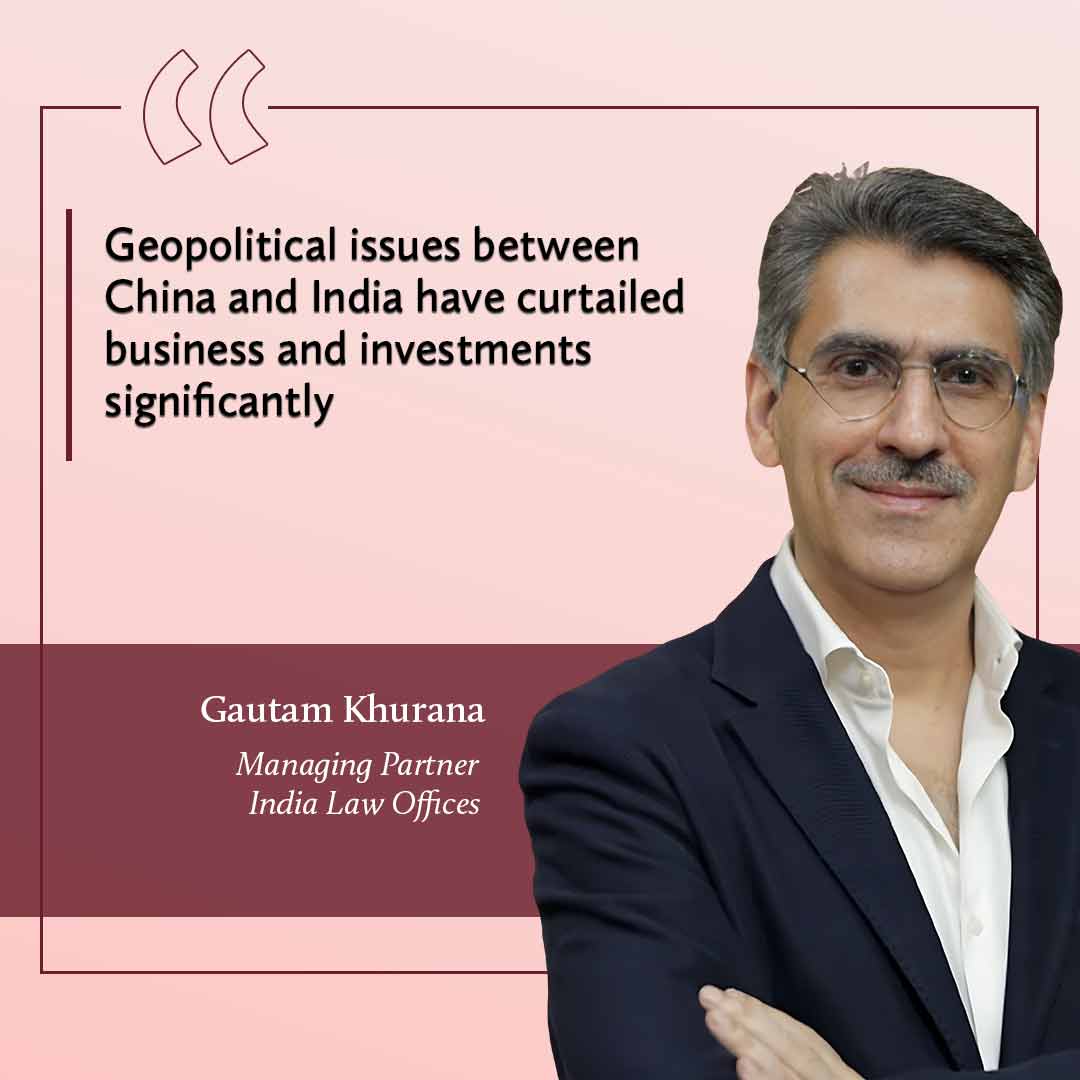From artificial intelligence and de-risking from China to energy transitions and global taxation, law firms and in-house counsel had plenty to keep them busy in 2023. George W Russell looks back at an eventful year
The winds of geopolitics swept the global legal landscape during 2023, blowing many sectors off course, from trade and supply chains to cross-border financial transactions. US sanctions on Russia caused many clients to pause transactions, while tension continued to affect relations across the Taiwan Strait, the Korean Peninsula and elsewhere in the Asia-Pacific region.
The most significant new shift during the course of 2023 was in diplomatic and economic relations between China and the West. North American and European economies are seeking to reduce their trade dependence on China and restrict Chinese access to advanced technology with potential military applications. Beijing is responding with sanctions of its own.
Private companies are also looking for alternatives. In November 2023, DHL chief executive Tobias Meyer told Bloomberg TV that a growing number of its customers sought manufacturing locations in Southeast Asia, or even in Mexico and Turkey, as companies look to reduce production reliance on China. “We really do see changes in the trade pattern,” he said.
The US led the way, with President Joe Biden’s executive order issued in August 2023, which constrains investment in advanced technology in China. Other governments, such as South Korea, have restrictions on outgoing flows into mainland China, but the US order threatens up to USD10 billion in investment, mostly in tech and startups. US private equity and venture capital investment into the mainland had already fallen 76% to USD7 billion in 2022 due to geopolitical tensions and the coronavirus pandemic.
“The most impactful – and not quite unexpected – event was probably the White House executive order in August 2023, which prohibits US investment in certain critical China tech, namely quantum informatics, semiconductors, and artificial intelligence (AI),” says Benjamin Qiu, a partner at Elliott Kwok Levine & Jaroslaw in New York.
Other countries – from Canada to India – have also put Chinese investment on notice by invoking security concerns. Robel Sahlu, an associate in the competition, antitrust and foreign investment group at Blake, Cassels & Graydon in Calgary, says: “Foreign investment from the Asia-Pacific region, particularly in Canadian businesses involved in critical minerals or sensitive technology areas, can expect to be subjected to enhanced pre-closing national security scrutiny by the Canadian government.”
Gautam Khurana, managing partner at India Law Offices in New Delhi, says one of the country’s most serious challenges to emerge is the inability of Chinese companies to do business. “Geopolitical issues between China and India have curtailed business and investments significantly,” he says. “We see an unprecedented interest from Indian as well as overseas clients to invest in manufacturing facilities in India – except for China.”
The investment curbs have occurred amid a year that saw a weak post-covid-19 recovery for China, as the property sector flatlined and consumer spending remained depressed. Kelvin Dalrymple, a senior credit officer at Moody’s Investors Service in London, says: “China’s slowdown could accelerate a de-risking of supply chains and moves towards greater self-sufficiency in key technologies and sectors already under way from geopolitics.”
A survey released in October by the Japan Chamber of Commerce and Industry (JCCI) revealed widespread disillusionment with China’s economic trajectory. A quarter of respondents said they would not invest further, while a further 22% said they would scale back existing investment plans.
Japanese enthusiasm for China has been cooling since the pandemic began, with the government setting aside USD2.2 billion to subsidise relocating industrial production back to Japan, or to Southeast Asia. “The perception of the economic situation among Japanese companies in China continues to be negative,” the JCCI wrote in its findings. “The situation is particularly severe in southern China, central China and western regions.”
Jonathan Goacher, a partner with Stephenson Harwood in Singapore and an expert on sanctions, says he detects some “unease” among Western investors in China. “Some investors are nearshoring,” he says. “For some based in the US, a supply chain tied to Mexico rather than China is looked at as better risk management.”
Western consultancies have faced increasing government scrutiny in China during 2023, with agents raiding US-based Bain & Company, due diligence group Mintz and expert network provider Capvision, while a senior executive at risk advisory firm Kroll has been barred from leaving the mainland. “The market is looking at this,” says Goacher.
Chinese authorities spent much of 2023 trying to shore up the economy by, among other initiatives, actively promoting electric vehicle (EV) production, battery production and investment in wind and solar generation. “However, market commentators are sceptical about the rate of growth of these industries, and whether they will effectively offset the job losses in the property market and other key sectors coming out of the pandemic,” says Jenny Zhuang, of counsel at Dentons in Hong Kong.
The effects of China’s sluggish recovery have spread beyond its shores. The end of the country’s pandemic curbs was a relief for Southeast Asian economies with strong links with China. Speaking on the Vietnam situation, Oliver Massmann, a partner and general director at Duane Morris in Hanoi, says: “The primary impact is reestablishment of the supply chain between Vietnam’s retailers and those in China. This reconnection includes the import of input materials from China.”
Yet despite such pressures, many foreign investors in China are staying put, having spent decades building up suppliers, plants and talent. Qiu says: “They realise that China has retained strengths in high-end manufacturing, and still sees growth opportunities in certain industries, such as EVs, thus certain businesses relating to manufacturing and sales in China will continue.”
Although capital markets are understandably quiet given the current level of US interest rates, Christopher Bickley, head of the Hong Kong office of Conyers, says there is a “steady flow” of Chinese companies looking to list in the US, “which shows economic ties between the two countries are still important”.
China hopes to build up its manufacturing and services bases to alleviate rising joblessness. Zhuang notes that the unemployment rate remains high, with youth unemployment in particular at a record level. “A sense of disillusionment and pessimism about the future is keeping young graduates out of the job market,” she says.
The year also saw the first full 12 months of Hong Kong’s Top Talent Pass Scheme, under which about 100,000 working visas were issued to 30 September, 2.5 times more than the total number granted in 2022. Bickley says: “Hong Kong is creating more opportunities to welcome talent from mainland China and other Southeast Asian countries to join the workforce, which in the middle to long run will benefit the whole region.”
Cutting-edge technology
The Asia-Pacific region continues to be a hotbed of technological innovation across a multitude of sectors.
In Taiwan, ProLogium Technology’s advanced solid state car batteries have attracted investment from Mercedes-Benz and Posco, while Japan’s Hirotsu Bio Science invented a revolutionary method of cancer detection using a tiny roundworm. Hong Kong-based Archireef makes synthetic coral reefs to rebuild ecosystems while, in India, ACE Green Recycling has pioneered small and replicable battery reuse facilities. But no development during 2023 matched AI in terms of capturing imagination and investment. Goldman Sachs Research estimates AI investment could approach USD100 billion in the US alone, and USD200 billion globally by 2025. Last year, 48% of total equity funding of AI startups came from China, compared with 38% funded from the US.
Matt Sheehan, a fellow at the Carnegie Endowment for International Peace, notes in a recent report: “China is the largest producer of AI research in the world, and its regulations will drive new research as companies seek out techniques to meet regulatory demands.”
But law firms have observed many regulatory roadblocks, as Lauren Hurcombe, partner and global co-chair of the technology and sourcing group at DLA Piper in Hong Kong, points out. “AI is such a broad area and largely the regulators across Asia have not yet offered a clear regulatory framework, especially as regards generative AI,” she says. “Most of this is driven by uncertainty on how to approach regulating AI in a way that fits the diverse needs, cultures and priorities of their own jurisdictions.”
After all, the wide use of AI has raised concerns about the risks. Albert Yuen, counsel and head of technology, media and telecommunications at Linklaters in Hong Kong, cites concerns ranging from existential threats, the spread of misinformation and biased outputs being created from biased datasets to protecting data privacy and intellectual property. “As a result, law and regulation have struggled to keep up,” says Yuen.
Hurcombe notes that one exception to this uncertainty is China, where generative AI legislation – the Provisional Provisions on Management of Generative Artificial Intelligence Services – came into force on 15 August 2023, and domestic tech companies have been encouraged to invest in the area. “The response we have seen is a large number of new players in the market and an uptick of international clients exploring potential partnerships with local generative AI providers in China,” she says.
AI is also becoming an integral part of law firm infrastructure. For example, in February 2023, Allen & Overy became the first law firm user of Harvey, an AI platform specifically for lawyers. Sequoia Capital, which led the Harvey fundraising round, said in April more than 15,000 law firms were on the platform’s waiting list.
Saranpaal Calais, a partner at Allen & Overy in Sydney, says: “Harvey is an intuitive platform that uses natural language processing, machine learning and data analytics to automate and enhance various aspects of legal work, such as contract analysis, due diligence, litigation and regulatory compliance. Harvey has helped our lawyers to deliver faster, smarter and more cost-effective solutions to their clients, including generating insights, recommendations and predictions based on large volumes of data.”
The year also saw turmoil in cryptocurrency, even as bitcoin’s volatility decreased. Scandals erupted both globally with the collapse of FTX (which had begun in November 2022) and regionally with the fallout from the implosion of Three Arrows Capital in Singapore during 2022 and the JPEX fraud scandal in Hong Kong that emerged in September 2023. In June 2023, the US Securities and Exchange Commission charged Binance, which operates the largest crypto asset trading platform in the world, with a variety of securities law violations.
Attitudes towards crypto varied greatly in Asia over the course of the year. The Philippines favoured more regulated crypto trades, while Singapore tightened rules in the wake of the Three Arrows fiasco and large losses by retail investors. South Korea continued its harsher stance since the 2022 Terra and Luna token crash. Mainland China has retained its outright ban, but Hong Kong wants to be a regional crypto hub.
Hong Kong’s new licensing regime for centralised virtual asset trading platforms under the Anti-Money Laundering and Counter-Terrorist Financing Ordinance came into effect in June 2023. Under the new regime, platforms operating in Hong Kong will need to apply to the Securities and Futures Commission (SFC) for a licence.
Katherine Liu, partner at Stephenson Harwood in Hong Kong, says there has been a mixed reaction to the licensing regime. “There were diverse views in the consultation,” she says. “If you become regulated by the SFC, maintenance and compliance costs are a lot higher, and the new framework could drive out smaller market players that wouldn’t be able to afford that added expenditure. There is always a delicate balance to be struck between investor protection and innovation.”
ESG and climate change
Environmental, social and governance (ESG) and climate-related concerns have made significant progress in Asia, as the Organisation for Economic Co-operation and Development (OECD) noted recently. There has been little evidence of pushback against ESG, as seen in the US where, in 2023, at least 165 anti-ESG bills have been introduced across 37 states, and ratings agency S&P Global has stopped handing out scores to corporate borrowers on ESG criteria.
Many Asian jurisdictions have issued ESG disclosure guidance to further strengthen practices and address challenges. David Kwok, senior managing associate at Dentons in Hong Kong, says ESG initiatives and sustainable finance have been a key focus in the Asia-Pacific region in 2023. “Japan, Singapore, South Korea, China and India have all made significant strides in their respective ESG initiatives, setting the stage for a more sustainable and transparent financial landscape,” he says.
Vivien Teu, a Dentons partner in Hong Kong, says the most significant ESG-related development this year was the formal publication in June of the General Requirements for Disclosure of Sustainability-related Financial Information (ISSB S1) and Climate-related Disclosures (ISSB S2), issued by the International Sustainability Standards Board. “Many [jurisdictions] in Asia are looking to adopt ISSB S2 as a global baseline for climate-related financial disclosures, including Hong Kong, Singapore, Malaysia, Indonesia, South Korea, Japan and Australia,” says Teu.
Most of those economies have focused on sustainability and green finance, although Japan has been leading the effort in Asia to promote human rights due diligence. Kaoru Umino, a partner at DLA Piper in Tokyo, notes that in April the Japanese government released the Guidelines on Respecting Human Rights in Responsible Supply Chains. “It contains practical guidance, case studies and examples of human rights risks in relevant sectors, as well as products that are prone to human rights abuses,” she says.
Radhika Dudhat, a partner at Shardul Amarchand Mangaldas & Co in Mumbai, notes that until 2023 Indian ESG “was fragmented and spread across various legislation”. It has now come under a “focused and unified regulatory framework” under the Securities and Exchange Board of India. “It is still in its evolving phase and is being implemented in a staggered manner across various companies and industries,” she says.
Global tax initiative
The OECD has released Pillar two Global Anti-Base Erosion (GloBE) model rules for a global minimum tax (GMT) applying to multinational enterprises with revenue greater than EUR750 million (USD815.9 million) in their consolidated financial statements. Many Asia-Pacific jurisdictions signed up to a landmark 2021 agreement that saw them enact GloBE rules in 2023 with an effective date of 1 January 2024.
Teu, at Dentons, says both governments and multinational enterprises are having to consider the reforms’ extensive implications and review their tax policies and practice accordingly, in an environment of more demanding reporting requirements and expected tax transparency. “Companies operating in multiple jurisdictions need to take a fresh look at existing structures and be prepared,” she says.
Asia is generally working in lockstep with Pillar two developments, lawyers say. Adeline Wong, head of Baker McKenzie’s Asia-Pacific tax practice, notes that jurisdictions such as South Korea, Japan, Hong Kong, Indonesia, Malaysia, Singapore, Vietnam and Thailand are working to implement the GMT in 2024 or 2025. “Asian governments are committed to achieving tax certainty and fair tax treatment while balancing national priorities,” she says.
Legal landmarks across region
One notable new piece of legislation in Australia during 2023 was the implementation of tougher rules for foreign investment in residential property, and stiffer penalties for violations. In June, Australia proposed amending the country’s decades-old foreign bribery law to remove the requirement for prosecutors to prove that a defendant had a specific advantage in mind when the bribe was paid. It would also create an offence for corporate failure to prevent foreign bribery. “The Australian parliament failed to pass earlier revisions to the foreign bribery law in 2017 and 2019,” notes Charles Duross, a Morrison & Foerster partner in Washington, in a recent client advisory.
The legislative agenda in China was dominated by international sanctions on its access to technology and other national security concerns, and what Qiu has describes as “the general shake-up of the country’s financial sector, which in part caused many Western financial institutions to withdraw from China”. In November, the Ministry of State Security said it would be a national security violation for anyone to “harbour a dim view of the market, short the market, talk the market down, or move assets out”. That, Qiu adds, “could be extremely impactful on the financial sector, including in Hong Kong, where informational and transactional financial freedom could be wiped out”.
One of the most notable legal events in India during 2023 was the enactment of a new data law. “It has sparked a rush with multiple companies prioritising data governance and privacy, and grappling with the impact of the law on their business practices,” says Mathew Chacko, founding partner at Spice Route Legal in Bangalore. Other significant changes include the Reserve Bank of India’s revamp of its compliance framework and the Competition Commission of India raising the cost of non-compliance with the competition law.
In Indonesia, parliament approved several significant laws including an omnibus law known as P2SK for the financial sector, covering banking, capital markets, insurance, payments, consumer protection and other areas. “The P2SK law also provides notable provisions that have piqued the interest of clients,” says Ira Eddymurthy, founding partner at SSEK Law Firm in Jakarta, citing Financial Services Authority oversight of digital assets, the debut of the digital rupiah, the launch of the Indonesian Carbon Exchange and the introduction of trustee and special purpose vehicles as financial instrument managers.
The change of government in New Zealand after the 14 October election is expected to result in the repeal of several laws passed in 2023. Examples include the extension of the goods and services tax to online marketplaces such as Uber and Airbnb, a capital gains tax on residential property held for less than 10 years, and the removal of interest deductibility for existing residential investments. “The outgoing Labour government introduced a number of new laws that proved difficult to apply, had unintended consequences and, in a number of cases, required significant amendment post-enactment to ensure workability,” says Bell Gully partner Graham Murray in Auckland.
The Philippines made headlines with the rapid passage in July of the Maharlika Investment Fund Act of 2023, establishing the country’s sovereign wealth fund. “This is a controversial piece of legislation, considering the haste with which it was approved by the Philippine legislature and its similarity to the 1MDB sovereign fund of Malaysia, which was corruption-ridden and had caused the indictment of Malaysia’s former prime minister,” notes Patricia Bunye, a partner at Cruz Marcelo & Tenefrancia in Manila.
In Taiwan, legal reform during 2023 saw improvements to IP law with an amendment to the IP Case Adjudication Act. “The amendment improves current trial procedures,” says Patrick Marros Chu, a partner at Lee and Li in Taipei. Key aspects, he adds, include changing the jurisdiction of IP cases, enhancing protection of trade secrets, adding a compulsory legal representation system, expanding expert participation, promoting electronic judicial services and easing the burden of proof to enhance trial efficiency. Other changes include lowering the threshold for the reporting and disclosure of substantial shareholding, a relaxation of merger control rules, the designation of Taiwan’s core critical technologies and the passage of amendments to the Act for Industrial Innovation.
Thailand addressed the rise of cryptocurrencies with its royal decree on digital platforms. “This far-reaching regulation established various registration and notification obligations for operators of digital platforms in Thailand,” says Kobkit Thienpreecha, a partner and director of corporate and commercial at Tilleke & Gibbins in Bangkok. “It also has extraterritorial effect on some digital platforms located overseas.” Thailand also introduced a new merger option for companies, closed a loophole through which individual taxpayers were able to bring their overseas income into Thailand without having to pay tax on it, and introduced fast-track procedures for trademarks.
Vietnam’s national assembly passed several key laws in 2023. These include the Law on Protection of Consumers’ Rights, the Revised Law on Bidding, the Law on E-transactions, the Law on Prices and the Co-operative Law. “These legal instruments have had a substantial impact in strengthening Vietnam’s legal framework,” says Massmann in Hanoi. The revised bidding law is expected to shed more light on international tenders and criteria for accessing bids and selecting winning bidders. “Thanks to more transparent procedures, bidding in Vietnam is more predictable and attractive to foreign investors,” says Massmann.
































